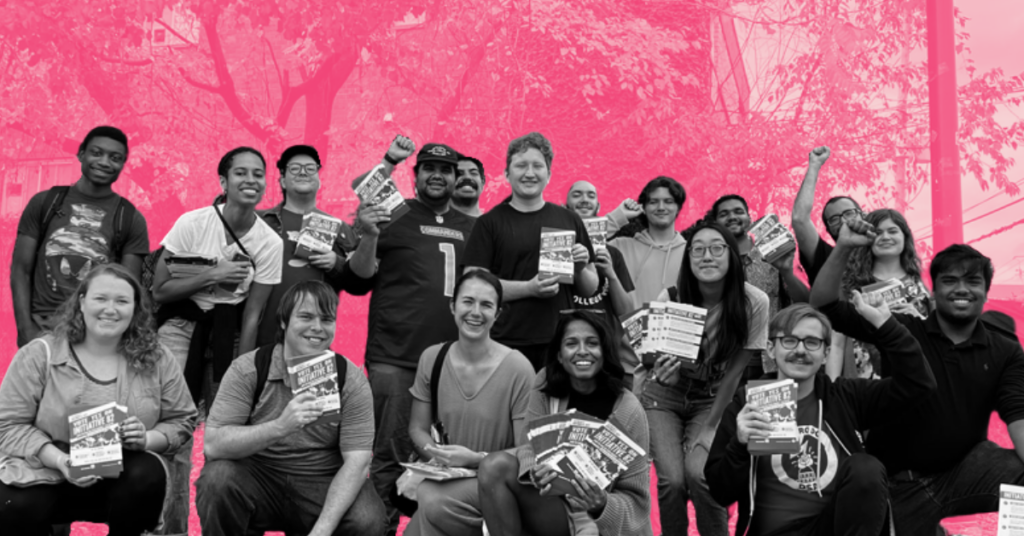Readings
- Van Gosse, “Who Is Working Class and Why It Matters,” Convergence, April 9, 2022.
- Karen Nussbaum, “Unions Protect Democracy, How Do We Protect Unions?,” The Nation, July 13, 2022.
- Bob Wing, “The White Republic and the Struggle for Racial Justice,” Convergence, April 29, 2022.
- Erica Chenoweth and Zoe Marks, “Beyond Roe: The Mutually Reinforcing Nature of Misogyny and Authoritarianism,” podcast and transcript, The Foreign Affairs Interview, July 7, 2022.
Key Points
- Because of the historic connection between White Christian Nationalism and capitalism, the emerging progressive current can be durable and effective only if it fights for the rights and interests of all who face injustice and discrimination in the US and around the world—and stands firm against attempts to fragment people using identity-based wedges. We stand for racial justice, gender justice, immigrant rights and language justice, disability justice, environmental justice, against ageism, homophobia, and transphobia. We embrace the fights for peace and against militarism, and the urgency of a just transition to a fossil-fuel-free, sustainable environment.
- The majority of people in this country are working-class. Because of its role in US capitalism this class has great potential power. A key element of gaining and exercising that power is organization—and unions are workers’ basic organization for day-to-day struggle against their employers. They are structure-based rather than self-selecting; they bring together people based on a common condition of their lives, not on a certain political opinion. Revitalizing and expanding the labor movement is therefore a prime task, and to be durable and effective a progressive trend must have deep roots in the working class in all its diversity.
- White supremacy has been a foundational aspect of US racial capitalism since 1619 and defense of white supremacy has been a driver of reactionary movements from the reversal of Reconstruction to the backlash against the gains of the 1960s which we are still living through today. And the fight for racial equality, the Black Freedom Movement in particular, has been a central force in advancing democracy and social justice for all sectors from abolitionism and Reconstruction to the Black-led Civil Rights Movement that reached a tipping point in the 1950s and 60s. Appeal to white grievance is at the heart of the MAGA bloc’s coherence today. The fight for racial justice must be a central feature of today’s fights to defend democracy and win structural change. The idea that the program of today’s emerging progressive trend is a call for a “Third Reconstruction” links us to this deep pattern in US history.
- Attacks on reproductive justice, bodily autonomy, LGBTQ rights, and the very right of transgender people to exist are central to the MAGA program. This reflects the theocracy-based patriarchal view of gender relations that pervades the MAGA bloc. Indeed, patriarchy, enforcement of rigid gender roles, and elevation of “strongman,” “masculine” leadership has been a fundamental feature of fascist movements almost everywhere they have arisen. These attacks fall hardest on women and LGBTQ people who are poor, working-class, and/or people of color. As the emerging progressive trend fights for full democratic rights and gender justice for people of all classes and combats the Right’s patriarchal world view, it has the responsibility to bring its anti-racist, working-class and internationalist politics into the fray.
- Concerning both race and gender, there are distinctly neoliberal understandings of what it means to fight for inclusion and democracy that can lead to unhelpful or divisive practices, as other forms of neoliberal “identity-essentialist” politics do. We have work to do in developing a lens on issues of inequality and discrimination that tie them to capitalism and attacks on the working classes.
Competing View
The most active controversy in the Left concerning the points in this session revolve around strategies to tackle both race and class/white supremacy and capitalism. Critiques go back and forth about alleged “race reductionism” and “class reductionism.” Convergence pieces have been aligned with the arguments in Bob Wing’s piece cited above, which opened a major symposium we organized. In numerous pieces we have stressed the way people of color-led, especially Black-led, fights against racism have driven forward the overall democratic and class struggle in this country. For a sample of the debate on this point, see Barry Eidlin’s response to Bob and Bob’s rejoinder to Barry.
Questions for Discussion
- The syllabus asserts that the majority of US people are working-class; that unleashing the potential power of this class is crucial for both the “block” and “build” components of political strategy; and that organization is crucial to building and unleashing that power. What level of power do you think working-class organizations currently possess in the US? What role do you see trade unions and other “structure based” organizations playing in increasing working-class unity and power?
- The left has long debated the complicated set of historical, theoretical, and strategic issues surrounding “race and class” in the US. Bob Wing and Barry Eidlin advance different views on how to address those in the current moment and generally. What do you make of their debate, and does it get to issues you confront in your own work? Do you think either strategy—or some other perspective—is the scaffolding needed for the current moment?
- Crusading against trans rights and trans people’s very existence seems to have replaced crusading against abortion at the top of MAGA’s current patriarchal agenda. Why do you think this is? What are the implications for the fights for women’s and LGBTQ rights going forward? And how are both stances connected to MAGA’s overall view of gender roles and how society should be organized?
